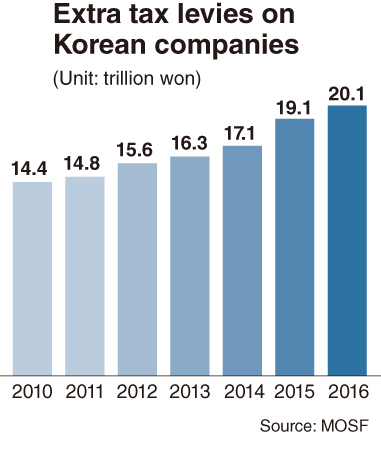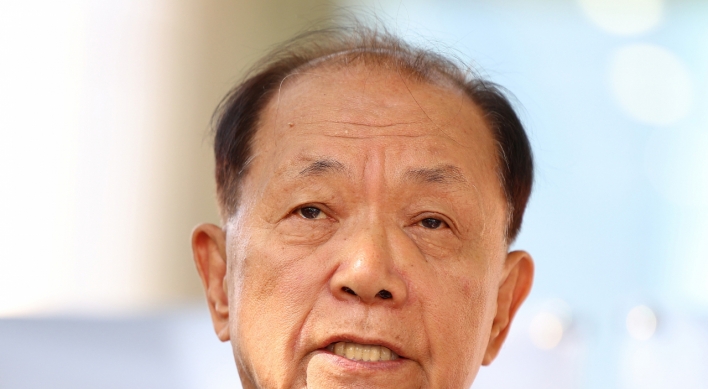Scandal brings renewed attention to 'quasi-tax' burdens on companies
By Korea HeraldPublished : Oct. 31, 2016 - 17:30
Allegations that President Park Geun-hye’s closest confidants used their influence to coerce the country’s big conglomerates into making multimillion-dollar donations to two nonprofit foundations have served to draw attention to the increasing extra tax burdens local companies are compelled to shoulder.
The Mir and K-Sports foundations, established in 2015 and early this year, respectively, collected about 80 billion won ($70 million) from 53 corporations in just a few months.

Choi Soon-sil, who masterminded the creation of the foundations, is now suspected of having peddled influence nearly without limits and having intervened in state affairs, based on her close personal ties to the president that date back some four decades.
Ahn Chong-bum, who was dismissed from the post of senior presidential secretary for policy coordination Sunday, is accused of pressuring the Federation of Korean Industries, a main business lobby, to spearhead the fundraising for the two foundations.
The FKI has said the companies involved voluntarily donated money to help promote Korean culture and sports globally.
The explanation sounds far from persuasive for the public, who are angered and frustrated with the repetition of bad practices from past authoritarian governments, which used to twist the arm of conglomerates to raise illicit political funds.
Media reports have suggested the controversial foundations are designed to finance Park’s post-retirement activities, with Choi being suspected of using part of the fund to buy property abroad and pay for her daughter’s education.
The alleged coercing of donations from conglomerates has shed light on data showing the burden imposed on local corporations aside from tax payments has continued to increase under Park’s administration.
“Contributions and donations made by companies have increased sharply in recent years,” said a corporate executive, asking not to be named.
According to data from business associations here, the amount of money raised by 255 major firms last year for the purpose of social contribution surpassed 2.9 trillion won, up 6.8 percent from 2.71 trillion won in the previous year.
Since Park took office in February 2013, seven new projects funded by corporate donations and contributions, including the two controversial foundations, have been put into practice.
Donations and contributions constitute a smaller part of quasi-taxes, which refer to all kinds of pecuniary burdens on enterprises, excluding production costs and taxes, generated in the course of business operation.
According to data from the Ministry of Strategy and Finance, statutory levies collected from companies for specific purposes increased from 15.6 trillion won in 2012 to 19.1 trillion won in 2015 and 20.1 trillion won this year.
Park’s administration has vowed to carry out her election pledges to expand welfare benefits without increasing taxes. Park and her economic aides have rejected calls by opposition parties to raise the maximum corporate tax rate, arguing such a move would hamper efforts to revive the flagging economy.
But the steep increase in quasi-taxes imposed on companies discredits or hollows the pledge not to raise taxes, economists say. They indicate a considerable part of statutory levies has been used like corporate tax revenues for other-than-designated purposes.
Critics say investments by 15 large companies to finance the creation of 17 regional centers designed to promote the “creative economy” advocated by Park may also be deemed as a kind of quasi-tax.
The total sum of quasi-taxes paid by companies is estimated to have exceeded corporate tax revenues, which amounted to 39.8 trillion won last year.
In a report released in 2009, the Organization for Economic Cooperation and Development indicated quasi-taxes are a practice unique to South Korea that harms its fiscal transparency.
“An increase in quasi-taxes weakens corporate activities and saps the national economy as a whole,” said Kim Chang-bae, an analyst at the Korea Economic Research Institute.
Government officials have said they are drawing up bills to make it mandatory to use statutory levies in accordance with specified purposes, repeal outdated ones and prevent the coercing of donations from companies.
The influence-peddling scandal involving Park’s confidants should serve to accelerate the work to eliminate problems with the practices of collecting and using quasi-taxes that have persisted over the past decades, experts say.
Amid the roil of anger over the scandal, which reminds South Koreans that old habits die hard, calls have been mounting for disbanding the FKI, long viewed as a symbol of collusive links between figures with political power and business circles.
By Kim Kyung-ho (khkim@heraldcorp.com)
The Mir and K-Sports foundations, established in 2015 and early this year, respectively, collected about 80 billion won ($70 million) from 53 corporations in just a few months.

Choi Soon-sil, who masterminded the creation of the foundations, is now suspected of having peddled influence nearly without limits and having intervened in state affairs, based on her close personal ties to the president that date back some four decades.
Ahn Chong-bum, who was dismissed from the post of senior presidential secretary for policy coordination Sunday, is accused of pressuring the Federation of Korean Industries, a main business lobby, to spearhead the fundraising for the two foundations.
The FKI has said the companies involved voluntarily donated money to help promote Korean culture and sports globally.
The explanation sounds far from persuasive for the public, who are angered and frustrated with the repetition of bad practices from past authoritarian governments, which used to twist the arm of conglomerates to raise illicit political funds.
Media reports have suggested the controversial foundations are designed to finance Park’s post-retirement activities, with Choi being suspected of using part of the fund to buy property abroad and pay for her daughter’s education.
The alleged coercing of donations from conglomerates has shed light on data showing the burden imposed on local corporations aside from tax payments has continued to increase under Park’s administration.
“Contributions and donations made by companies have increased sharply in recent years,” said a corporate executive, asking not to be named.
According to data from business associations here, the amount of money raised by 255 major firms last year for the purpose of social contribution surpassed 2.9 trillion won, up 6.8 percent from 2.71 trillion won in the previous year.
Since Park took office in February 2013, seven new projects funded by corporate donations and contributions, including the two controversial foundations, have been put into practice.
Donations and contributions constitute a smaller part of quasi-taxes, which refer to all kinds of pecuniary burdens on enterprises, excluding production costs and taxes, generated in the course of business operation.
According to data from the Ministry of Strategy and Finance, statutory levies collected from companies for specific purposes increased from 15.6 trillion won in 2012 to 19.1 trillion won in 2015 and 20.1 trillion won this year.
Park’s administration has vowed to carry out her election pledges to expand welfare benefits without increasing taxes. Park and her economic aides have rejected calls by opposition parties to raise the maximum corporate tax rate, arguing such a move would hamper efforts to revive the flagging economy.
But the steep increase in quasi-taxes imposed on companies discredits or hollows the pledge not to raise taxes, economists say. They indicate a considerable part of statutory levies has been used like corporate tax revenues for other-than-designated purposes.
Critics say investments by 15 large companies to finance the creation of 17 regional centers designed to promote the “creative economy” advocated by Park may also be deemed as a kind of quasi-tax.
The total sum of quasi-taxes paid by companies is estimated to have exceeded corporate tax revenues, which amounted to 39.8 trillion won last year.
In a report released in 2009, the Organization for Economic Cooperation and Development indicated quasi-taxes are a practice unique to South Korea that harms its fiscal transparency.
“An increase in quasi-taxes weakens corporate activities and saps the national economy as a whole,” said Kim Chang-bae, an analyst at the Korea Economic Research Institute.
Government officials have said they are drawing up bills to make it mandatory to use statutory levies in accordance with specified purposes, repeal outdated ones and prevent the coercing of donations from companies.
The influence-peddling scandal involving Park’s confidants should serve to accelerate the work to eliminate problems with the practices of collecting and using quasi-taxes that have persisted over the past decades, experts say.
Amid the roil of anger over the scandal, which reminds South Koreans that old habits die hard, calls have been mounting for disbanding the FKI, long viewed as a symbol of collusive links between figures with political power and business circles.
By Kim Kyung-ho (khkim@heraldcorp.com)
-
Articles by Korea Herald






![[KH Explains] No more 'Michael' at Kakao Games](http://res.heraldm.com/phpwas/restmb_idxmake.php?idx=644&simg=/content/image/2024/04/28/20240428050183_0.jpg&u=20240428180321)











![[Herald Interview] Mistakes turn into blessings in street performance, director says](http://res.heraldm.com/phpwas/restmb_idxmake.php?idx=652&simg=/content/image/2024/04/28/20240428050150_0.jpg&u=20240428174656)
